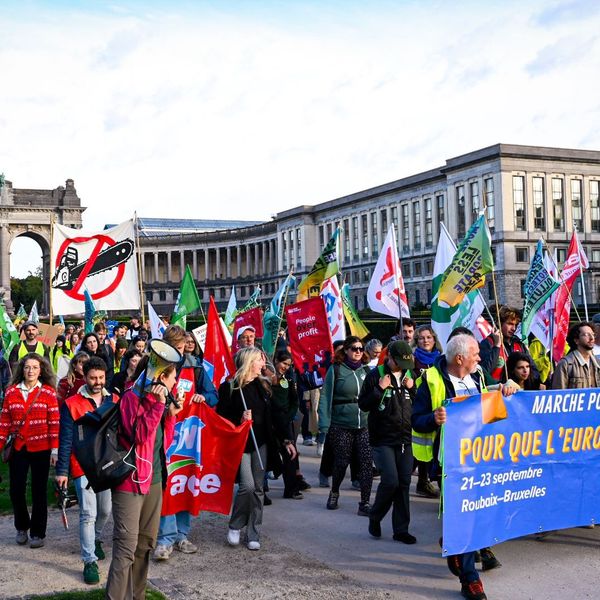'Final Death Blow' to CETA as Delegates Hold Firm Against Pro-Corporate Deal
"It's time for a fundamental shift toward international agreements that put people and the planet before corporate profits. That's the message from Europe today."
Dealing what campaigners say is the final "death blow" to the pro-corporate Canada-European Union trade deal, negotiations collapsed on Friday after representatives from the Belgian region of Wallonia refused to agree to a deal that continues ignore democracy in favor of multi-national corporations.
Canada's International Trade Minister Chrystia Freeland reportedly walked out of talks with the Wallonia delegation, which had ruled to maintain their veto against the Comprehensive Economic and Trade Agreement (CETA) after the parties reached a stalemate over the controversial Investor State Dispute Settlement (ISDS) system.
"We made new significant progress, especially on the agriculture issues, but difficulties remain, specifically on the symbolic issue of arbitration, which is politically extremely important," Wallonia president Paul Magnette told the regional parliament. ISDS permits companies to sue governments over perceived loss of profits due to regulations or other laws.
Magnette had told reporters Thursday that the delegation had particular concerns over "matters affecting U.S. companies in Canada which will benefit from the system."
Friday's talks were held as a last-ditch effort to save the trade deal. After they fell apart, an emotional Freeland told reporters, "I've worked very, very hard, but I think it's impossible," referring to the impasse. "It's become evident for me, for Canada, that the European Union isn't capable now to have an international treaty even with a country that has very European values like Canada."

Campaigners who have led the fight against CETA and its sister trade deals--the Trans-Pacific Partnership (TPP) and the Transatlantic Trade and Investment Partnership (TTIP)--rejoiced over the news, saying the planned October 27 signing ceremony now looks "improbable."
"Canada's trade minister may be 'very, very sad', but there are millions of people in Europe who will be very, very happy," said Mark Dearn, senior trade campaigner with the UK-based War on Want.
And while many were happily toasting Magnette and the Wallonia delegation, critics of the deal also emphasized the growing movement against these anti-democratic agreements that helped lead to CETA's downfall.
"This major setback for CETA is not just because of Wallonia alone," said Maude Barlow, national chairperson of the Council of Canadians. "There is deep, widespread opposition to CETA and many millions of people agree with Wallonia's stance."
"Thousands across Europe and Canada spoke up and took action to make this happen," added Barlow, who is currently in Germany campaigning against CETA. "This collapse of attempts to reach a deal on CETA shows governments should listen to people instead of trying to push these deals through against the wishes of the people they're elected to represent."
As Dearn further explained, "Since talks first started on CETA back in 2009, the deal has sat alongside TTIP [referring to the U.S.-E.U. agreement] as an example of how not to do a trade deal--absolute secrecy, zero input from public interest groups, and sheer contempt for the very valid concerns of people across Europe."
"Today we have seen the European Commission's chickens come home to roost," he continued. "If the Commission fails at yet another trade deal, the fault lies wholly with its anti-democratic approach."
Speaking from the negotiations in Belgium, Sujata Dey, trade campaigner with the Council of Canadians, agreed. "It's time to take a long hard look at CETA and what this breakdown means for corporate-led globalization, including for other controversial deals like the [12-nation TPP]."
"It's time for a fundamental shift toward international agreements that put people and the planet before corporate profits," she added. "That's the message from Europe today."
An Urgent Message From Our Co-Founder
Dear Common Dreams reader, The U.S. is on a fast track to authoritarianism like nothing I've ever seen. Meanwhile, corporate news outlets are utterly capitulating to Trump, twisting their coverage to avoid drawing his ire while lining up to stuff cash in his pockets. That's why I believe that Common Dreams is doing the best and most consequential reporting that we've ever done. Our small but mighty team is a progressive reporting powerhouse, covering the news every day that the corporate media never will. Our mission has always been simple: To inform. To inspire. And to ignite change for the common good. Now here's the key piece that I want all our readers to understand: None of this would be possible without your financial support. That's not just some fundraising cliche. It's the absolute and literal truth. We don't accept corporate advertising and never will. We don't have a paywall because we don't think people should be blocked from critical news based on their ability to pay. Everything we do is funded by the donations of readers like you. Will you donate now to help power the nonprofit, independent reporting of Common Dreams? Thank you for being a vital member of our community. Together, we can keep independent journalism alive when it’s needed most. - Craig Brown, Co-founder |
Dealing what campaigners say is the final "death blow" to the pro-corporate Canada-European Union trade deal, negotiations collapsed on Friday after representatives from the Belgian region of Wallonia refused to agree to a deal that continues ignore democracy in favor of multi-national corporations.
Canada's International Trade Minister Chrystia Freeland reportedly walked out of talks with the Wallonia delegation, which had ruled to maintain their veto against the Comprehensive Economic and Trade Agreement (CETA) after the parties reached a stalemate over the controversial Investor State Dispute Settlement (ISDS) system.
"We made new significant progress, especially on the agriculture issues, but difficulties remain, specifically on the symbolic issue of arbitration, which is politically extremely important," Wallonia president Paul Magnette told the regional parliament. ISDS permits companies to sue governments over perceived loss of profits due to regulations or other laws.
Magnette had told reporters Thursday that the delegation had particular concerns over "matters affecting U.S. companies in Canada which will benefit from the system."
Friday's talks were held as a last-ditch effort to save the trade deal. After they fell apart, an emotional Freeland told reporters, "I've worked very, very hard, but I think it's impossible," referring to the impasse. "It's become evident for me, for Canada, that the European Union isn't capable now to have an international treaty even with a country that has very European values like Canada."

Campaigners who have led the fight against CETA and its sister trade deals--the Trans-Pacific Partnership (TPP) and the Transatlantic Trade and Investment Partnership (TTIP)--rejoiced over the news, saying the planned October 27 signing ceremony now looks "improbable."
"Canada's trade minister may be 'very, very sad', but there are millions of people in Europe who will be very, very happy," said Mark Dearn, senior trade campaigner with the UK-based War on Want.
And while many were happily toasting Magnette and the Wallonia delegation, critics of the deal also emphasized the growing movement against these anti-democratic agreements that helped lead to CETA's downfall.
"This major setback for CETA is not just because of Wallonia alone," said Maude Barlow, national chairperson of the Council of Canadians. "There is deep, widespread opposition to CETA and many millions of people agree with Wallonia's stance."
"Thousands across Europe and Canada spoke up and took action to make this happen," added Barlow, who is currently in Germany campaigning against CETA. "This collapse of attempts to reach a deal on CETA shows governments should listen to people instead of trying to push these deals through against the wishes of the people they're elected to represent."
As Dearn further explained, "Since talks first started on CETA back in 2009, the deal has sat alongside TTIP [referring to the U.S.-E.U. agreement] as an example of how not to do a trade deal--absolute secrecy, zero input from public interest groups, and sheer contempt for the very valid concerns of people across Europe."
"Today we have seen the European Commission's chickens come home to roost," he continued. "If the Commission fails at yet another trade deal, the fault lies wholly with its anti-democratic approach."
Speaking from the negotiations in Belgium, Sujata Dey, trade campaigner with the Council of Canadians, agreed. "It's time to take a long hard look at CETA and what this breakdown means for corporate-led globalization, including for other controversial deals like the [12-nation TPP]."
"It's time for a fundamental shift toward international agreements that put people and the planet before corporate profits," she added. "That's the message from Europe today."
Dealing what campaigners say is the final "death blow" to the pro-corporate Canada-European Union trade deal, negotiations collapsed on Friday after representatives from the Belgian region of Wallonia refused to agree to a deal that continues ignore democracy in favor of multi-national corporations.
Canada's International Trade Minister Chrystia Freeland reportedly walked out of talks with the Wallonia delegation, which had ruled to maintain their veto against the Comprehensive Economic and Trade Agreement (CETA) after the parties reached a stalemate over the controversial Investor State Dispute Settlement (ISDS) system.
"We made new significant progress, especially on the agriculture issues, but difficulties remain, specifically on the symbolic issue of arbitration, which is politically extremely important," Wallonia president Paul Magnette told the regional parliament. ISDS permits companies to sue governments over perceived loss of profits due to regulations or other laws.
Magnette had told reporters Thursday that the delegation had particular concerns over "matters affecting U.S. companies in Canada which will benefit from the system."
Friday's talks were held as a last-ditch effort to save the trade deal. After they fell apart, an emotional Freeland told reporters, "I've worked very, very hard, but I think it's impossible," referring to the impasse. "It's become evident for me, for Canada, that the European Union isn't capable now to have an international treaty even with a country that has very European values like Canada."

Campaigners who have led the fight against CETA and its sister trade deals--the Trans-Pacific Partnership (TPP) and the Transatlantic Trade and Investment Partnership (TTIP)--rejoiced over the news, saying the planned October 27 signing ceremony now looks "improbable."
"Canada's trade minister may be 'very, very sad', but there are millions of people in Europe who will be very, very happy," said Mark Dearn, senior trade campaigner with the UK-based War on Want.
And while many were happily toasting Magnette and the Wallonia delegation, critics of the deal also emphasized the growing movement against these anti-democratic agreements that helped lead to CETA's downfall.
"This major setback for CETA is not just because of Wallonia alone," said Maude Barlow, national chairperson of the Council of Canadians. "There is deep, widespread opposition to CETA and many millions of people agree with Wallonia's stance."
"Thousands across Europe and Canada spoke up and took action to make this happen," added Barlow, who is currently in Germany campaigning against CETA. "This collapse of attempts to reach a deal on CETA shows governments should listen to people instead of trying to push these deals through against the wishes of the people they're elected to represent."
As Dearn further explained, "Since talks first started on CETA back in 2009, the deal has sat alongside TTIP [referring to the U.S.-E.U. agreement] as an example of how not to do a trade deal--absolute secrecy, zero input from public interest groups, and sheer contempt for the very valid concerns of people across Europe."
"Today we have seen the European Commission's chickens come home to roost," he continued. "If the Commission fails at yet another trade deal, the fault lies wholly with its anti-democratic approach."
Speaking from the negotiations in Belgium, Sujata Dey, trade campaigner with the Council of Canadians, agreed. "It's time to take a long hard look at CETA and what this breakdown means for corporate-led globalization, including for other controversial deals like the [12-nation TPP]."
"It's time for a fundamental shift toward international agreements that put people and the planet before corporate profits," she added. "That's the message from Europe today."

